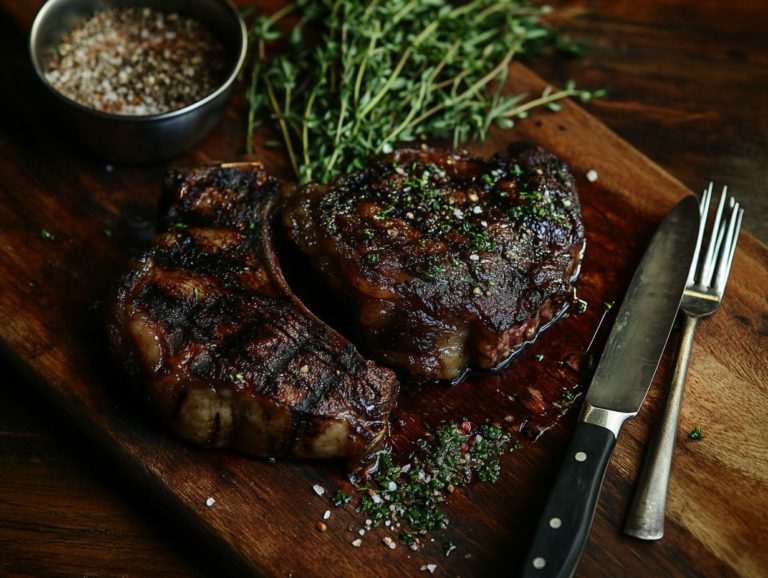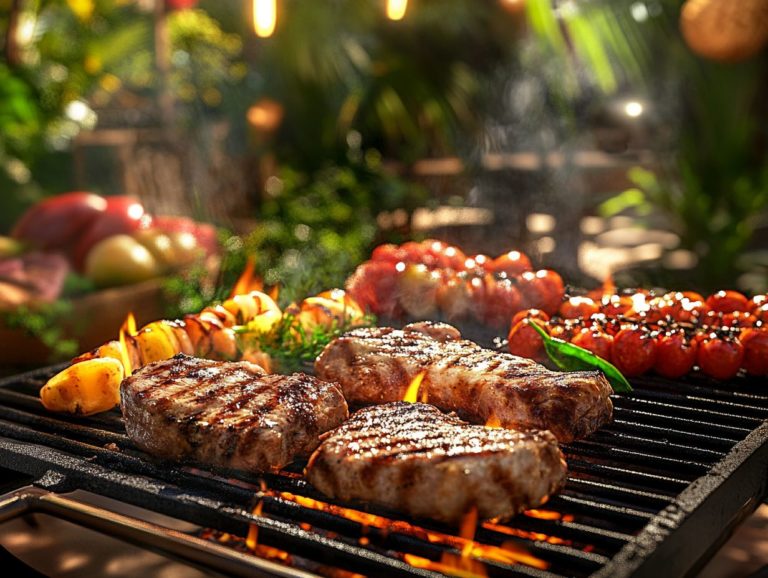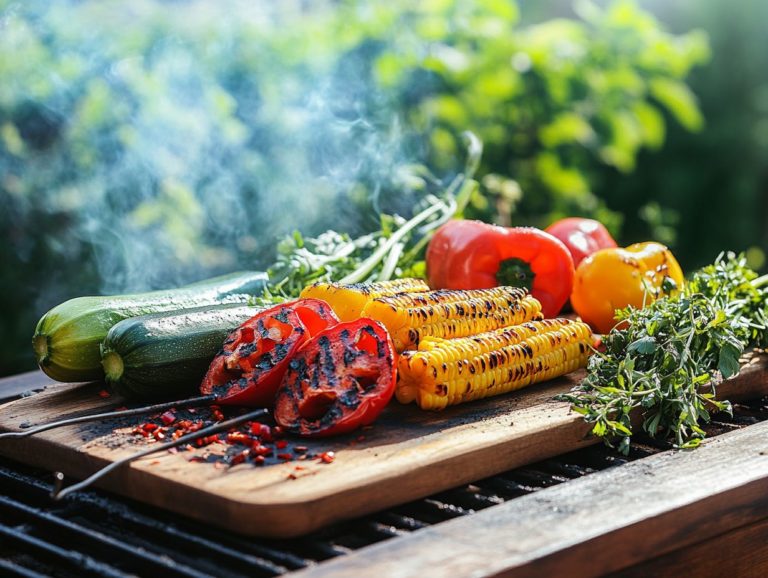The Art of Grilling Kebabs: Tips and Techniques
Kebabs are the life of any outdoor party! Their juicy flavors and endless variety make them irresistible. This guide will equip you with the essentials for crafting the perfect kebab from choosing the ideal meats and vegetables to creating flavorful mixtures used to soak them before cooking.
Discover the best grilling techniques to achieve that irresistible char, and learn how to present your kebabs in a way that dazzles. You ll tackle common grilling challenges, ensuring your next barbecue is nothing short of a culinary triumph.
Get ready to wow your friends and family with your newfound kebab expertise!
Contents
Key Takeaways:
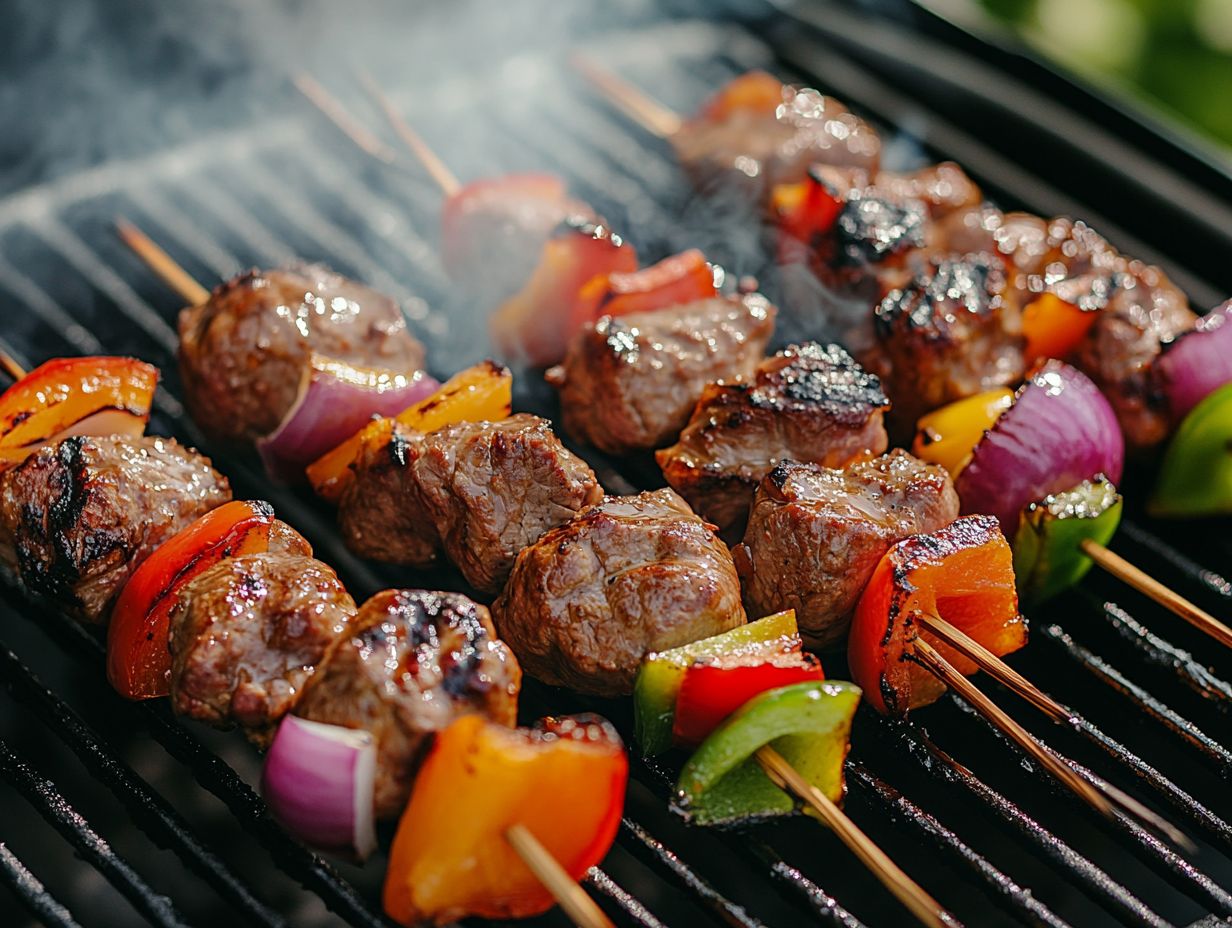
- Choose high-quality ingredients to ensure flavorful kebabs.
- Experiment with marinades to find your perfect flavor.
- Master proper grilling techniques for visually appealing kebabs every time.
What are Kebabs?
Kebabs are a culinary delight that beckons from diverse cultures, featuring marinated meat or vegetables elegantly skewered and grilled to perfection over an open flame. Picture a medley of ingredients chicken, beef, pork, or shrimp each marinated in a symphony of flavorful blends and served with a variety of tantalizing sauces or sides.
This dish showcases an array of styles, particularly in Middle Eastern cuisine, where skewers are infused with aromatic spices, achieving a tender-crisp texture that preserves the savory essence of the ingredients. Whether you re firing up the outdoor grill or utilizing an air fryer, kebabs present a delicious and versatile option for your summer cooking repertoire.
The rich culinary history of kebabs stretches back thousands of years, with each region contributing its own unique twist. Middle Eastern kebabs often come alive with spices like sumac and za’atar, enhancing their flavor profile, while Asian variations such as skewered satay delight with a creamy peanut or coconut sauce.
Other popular techniques include tandoori grilling, which imparts a mesmerizing smoky flavor, and the use of bamboo skewers for effortless convenience. Recipes can vary widely, showcasing vibrant ingredients like bell peppers and onions, making each dish not only visually appealing but also nutritious.
This adaptability reflects rich cultural influences and cements kebabs as a beloved global favorite.
Choosing the Right Ingredients
Selecting the right ingredients is essential for crafting perfect kebabs; the choice of meat and vegetables greatly influences the overall flavor and texture of the final dish. You cannot underestimate the importance of using fresh, high-quality ingredients, as they enhance not only the taste but also the entire dining experience.
Picture succulent chicken, tender beef, and vibrant asparagus alongside bell peppers a medley of flavors that creates an unforgettable culinary journey. The right marinade can elevate your dish, infusing it with layers of seasoning that beautifully complement the natural essence of your chosen ingredients.
Meat Selection and Preparation
Choosing the right meat for your kebabs is absolutely essential, as each type brings its own unique flavors and textures that elevate the entire dish.
Exploring various meats can significantly enhance your kebab experience. Take lamb, for example; its rich, gamey taste is perfect, especially when marinated in yogurt and spices, which tenderizes the meat beautifully. Venison is another intriguing option, offering a lean profile that shines when marinated in red wine and herbs.
In terms of cooking, you have options: skewers can be grilled over direct heat for that irresistible char, or roasted in the oven for a more controlled cooking method. Cooking times can vary, with chicken typically needing around 15-20 minutes, while beef may take just 10-15 minutes, depending on the cut and your preferred doneness.
Properly balancing flavors with marinades like using citrus for acidity or fresh herbs for brightness can truly transform the taste, ensuring that each meal is a delightful experience.
Vegetable and Fruit Options
Incorporating vegetables and fruits into your kebabs not only adds vibrant color and texture but also elevates the overall flavor of the dish. Think about popular choices like bell peppers, onions, cherry tomatoes, and lively asparagus. These not only deliver a tender-crisp contrast to marinated meats but make every bite visually appealing.
You might also consider seasonal fruits like pineapple and peaches. They skewer beautifully, adding a sweet touch that harmonizes perfectly with savory meats.
When grilling, remember to pay attention to the cooking times of various ingredients. This ensures each component is cooked to perfection and bursting with flavor.
To truly elevate your kebab game, zucchini and mushrooms are fantastic additions. They offer unique flavor and moisture, pairing wonderfully with the smokiness of the grill. Slice them into even pieces to encourage uniform cooking no one likes a kebab that s over-charred in spots!
Marinating your ingredients in olive oil, herbs, and spices before skewering will enhance their natural flavors while also creating a delicious caramelization on the grill.
Explore exciting combinations like eggplant with cherry tomatoes or pairing sweet fruits with spicy meats! These delightful flavor explorations are sure to impress your guests at your next barbecue.
Marinades and Seasonings
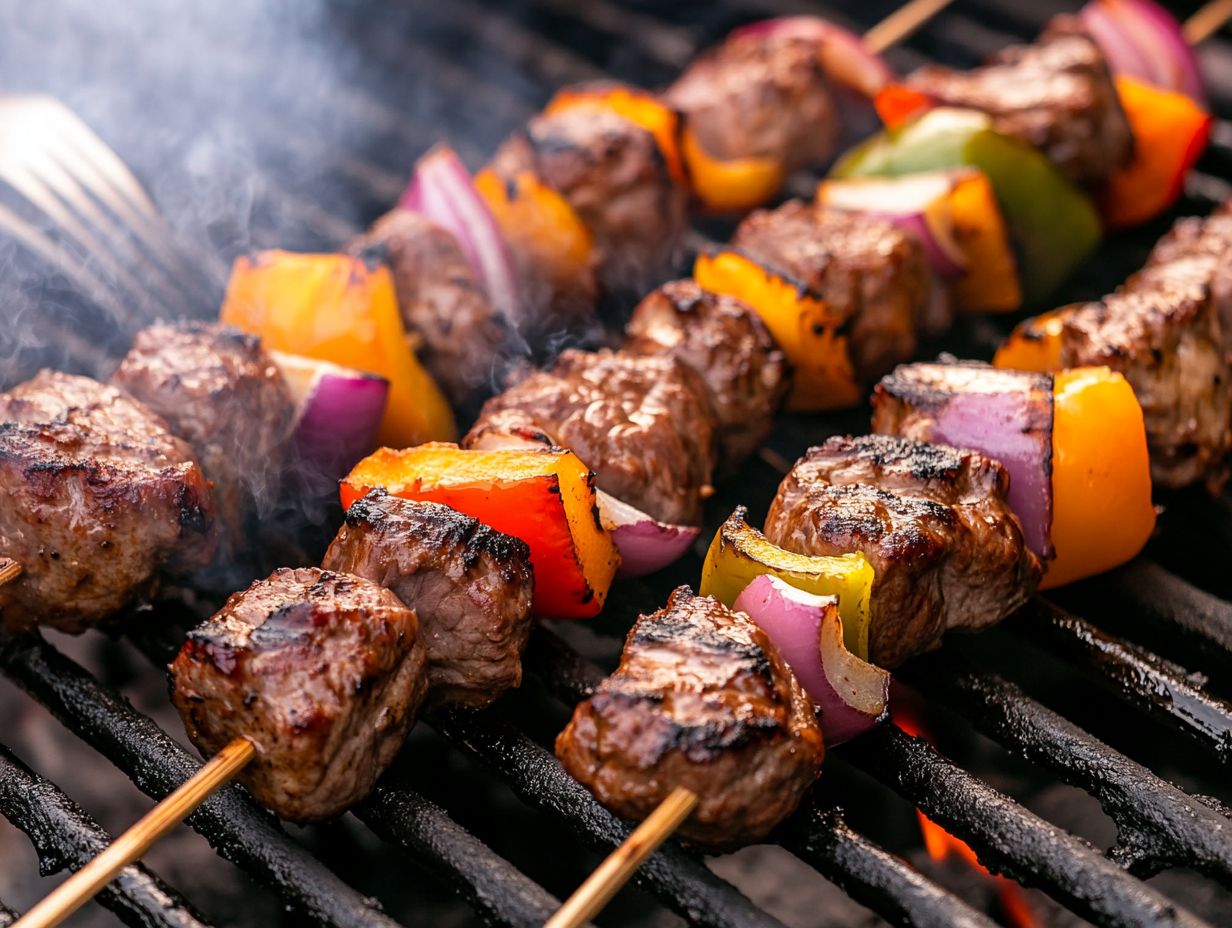
Marinades and seasonings are essential for elevating the flavor and tenderness of kebabs, turning ordinary ingredients into a delightful feast.
Picture a well-crafted marinade that combines olive oil, lemon juice, garlic, and spices like cumin, coriander, or turmeric. This blend creates a complex flavor that infuses the meat and vegetables.
If you re in the mood for an Asian twist, consider using teriyaki sauce or adding a touch of honey to balance out the spices with its natural sweetness.
As the ingredients soak in these flavors during the marinating process, you can look forward to every bite bursting with mouthwatering taste.
Enhancing Flavor and Tenderness
Enhancing the flavor and tenderness of your kebabs requires a thoughtful approach to marinating, which means soaking food in a seasoned liquid to enhance its flavor, and a discerning selection of spices.
To maximize the benefits of marinating, it s best to start the process several hours or even overnight in advance. This allows the proteins to absorb the rich flavors fully. If you re keen to experiment with spice combinations, blend smoked paprika with cayenne for a delightful kick on beef. For chicken kebabs, a splash of lemon paired with fresh herbs can elevate the dish to new heights.
This meticulous strategy guarantees an aromatic infusion and significantly boosts tenderness. When grilling, remember to rotate those skewers every few minutes. This ensures even cooking, making each kebab equally succulent and bursting with flavor.
Grilling Techniques for Kebabs
Mastering grilling techniques is essential for achieving the perfect kebab, whether you choose to cook over direct or indirect heat.
Direct heat grilling is your go-to for quick-cooking skewers, allowing those ingredients to develop a beautiful char while locking in moisture. On the other hand, if you re working with larger cuts, indirect heat is preferable, offering even cooking without the risk of burning.
By understanding cooking times based on the type of meat or vegetables you’re using, you can ensure that each component is cooked to perfection. The positioning of your skewers on the grill significantly impacts cooking efficiency, so pay attention to this detail for optimal results.
Direct vs. Indirect Heat
When you’re grilling kebabs, the choice between direct and indirect heat is important for achieving that perfect outcome. With direct heat grilling, your food sizzles right over the flames, allowing for quick cooking that’s ideal for smaller pieces of marinated meat and vibrant vegetables. This method results in that irresistible char!
On the other hand, indirect heat allows for a slower cook, making it the better option for larger cuts or foods that need more time to shine. Understanding which method to use can greatly influence the texture and flavor of your kebabs.
Using direct heat is your best bet for tender ingredients like shrimp or thinly sliced bell peppers. The high temperatures help turn them brown and sweeten their natural flavors.
Indirect heat, however, works best for heartier items like beef or chicken thighs. This method ensures a juicy interior while developing a rich, smoky essence.
Keep a close eye on cooking times! Thicker cuts will require a bit more patience, while quick-cooking vegetables are ready in just a few minutes for that perfect roast. Pairing these techniques with the right marinades can elevate your grilling game, leading to a truly delightful dining experience.
Skewering and Cooking Times
Mastering proper skewering techniques is essential for ensuring your kebabs cook evenly and remain easy to manage on the grill. Opting for metal skewers offers stability and durability, while bamboo skewers can be a lighter alternative but remember, they may need soaking to prevent burning.
Different meats and vegetables require varying cooking times to achieve their ideal doneness. Regularly checking on your kebabs while grilling helps prevent overcooking and ensures that delightful tender-crisp finish you desire!
To achieve the best results, pay attention to spacing when arranging ingredients on the skewer. Leaving some space between each piece allows heat to circulate, promoting an even cook on all sides.
For example, when using a variety of proteins and veggies, alternate denser items like chicken or beef with quicker-cooking vegetables such as bell peppers and zucchini. Typically, chicken may take about 15-20 minutes to grill, while shrimp could be done in as little as 5-7 minutes.
By following these best practices, you can elevate your grilling experience and create delicious, visually appealing skewers for any occasion!
Serving and Presentation
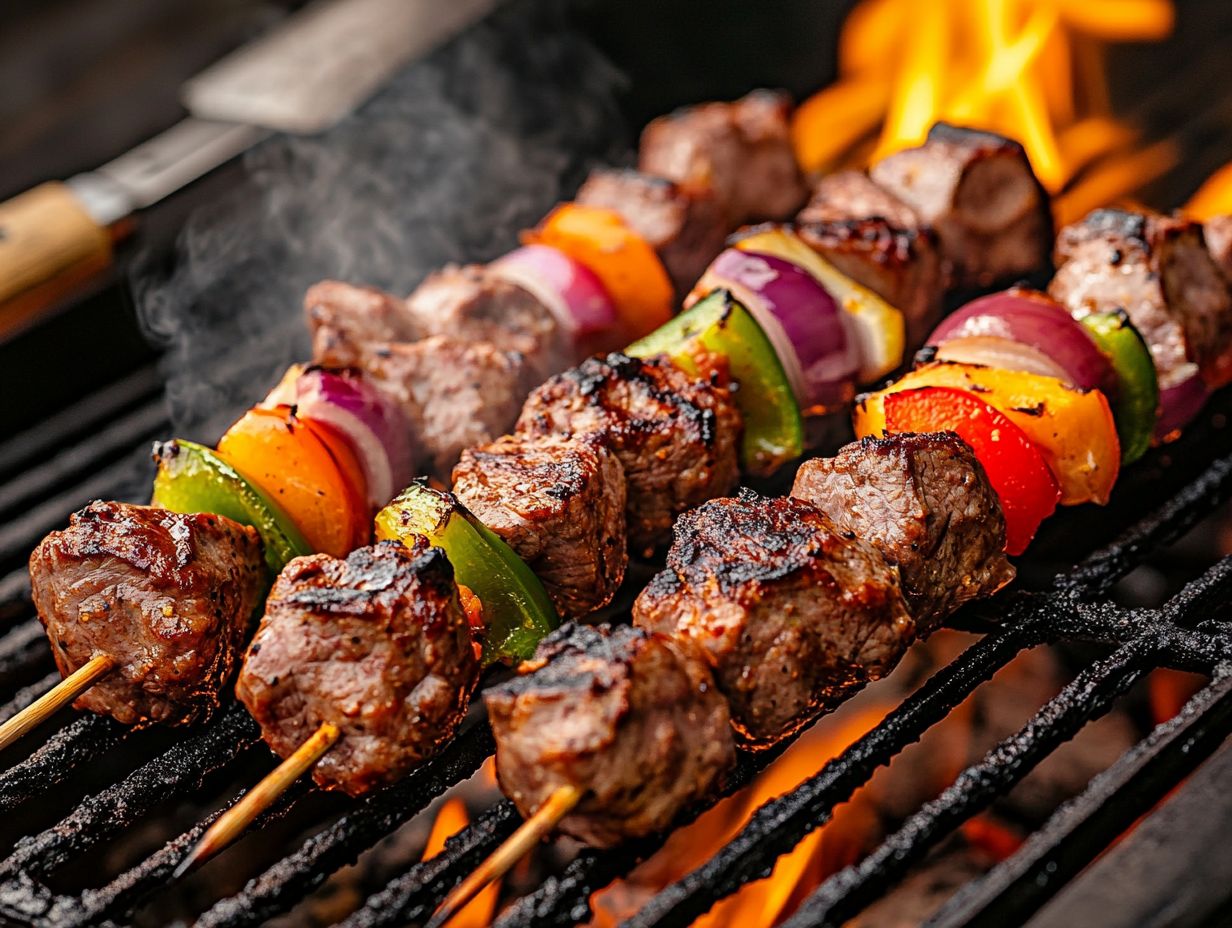
The art of serving and presentation can transform your kebabs from a simple meal into a culinary masterpiece that captivates the senses. Picture this: arranging your skewers on a vibrant platter, adorned with fresh herbs or zesty citrus slices. This adds a splash of color and invites your guests to dig in!
The accompaniments you choose are crucial for enhancing the overall dining experience. Fragrant rice, refreshing salads, or versatile dipping sauces can elevate the flavors of your kebabs to new heights.
A thoughtful presentation highlights your culinary prowess and ensures a memorable dining experience for your family and friends!
Garnishes and Accompaniments
Garnishes and accompaniments are essential for elevating kebabs and enhancing their presentation on your dining table.
By thoughtfully selecting vibrant options, you can craft a feast that captivates both the eyes and the palate. For example, a sprinkle of pomegranate seeds provides a delightful sweet contrast, while pickled red onions add an enticing tang that excites the senses.
An array of side dishes, like creamy yogurt-based sauces or spicy chutneys, serves as delightful dips that amplify the smoky flavors of the grilled meat.
To round out your meal, consider offering an assortment of colorful salads, such as tabbouleh or a refreshing cucumber and tomato salad. These introduce fresh textures and tastes that harmonize beautifully with the hearty kebabs.
Such careful pairings elevate the dish and deepen your overall dining experience, transforming a simple meal into a true culinary celebration!
Troubleshooting Common Kebab Grilling Issues
Grilling kebabs is not just cooking; it’s an adventure waiting to happen! However, it comes with its own set of challenges. You may encounter common issues like overcooking, undercooking, or burnt skewers. By understanding these pitfalls and knowing how to troubleshoot them, you can ensure your kebabs emerge perfectly every time.
Overcooked kebabs often turn dry and tough, while undercooked meat raises food safety concerns. Preventing skewers from burning is crucial for keeping your dish looking great and maintaining the quality of your meal.
Overcooking and Undercooking
Nailing the perfect level of doneness is a challenge. Overcooking leads to dry, tough meat, and undercooking is a safety hazard you definitely want to avoid. Understanding the right cooking times for various meats and vegetables is essential for your grilling success. A meat thermometer a handy tool to check if meat is cooked properly can be your best friend here. Keep a vigilant eye on the grill, adjusting the heat as needed to sidestep these common pitfalls.
For chicken, beef, and lamb, aim for specific internal temperatures: chicken should hit 165 F, while beef and lamb can be perfectly medium-rare at 145 F. For vegetables, the key is knowing when they re tender yet still vibrant. A solid rule of thumb is to grill your kebabs over direct heat for about 10-15 minutes, turning them occasionally for even cooking.
Pay attention to visual cues; you want your meats to have a beautiful sear with juices running clear, while vegetables should be slightly charred yet still firm. These indicators will help you master the grilling process, ensuring that your kebabs are not only delicious but safe to enjoy every single time.
Preventing Skewers from Burning
To prevent skewers from burning, especially bamboo ones that are prone to igniting, soak them in water for at least 30 minutes before grilling. This significantly reduces the risk of a fiery disaster.
Arranging your skewers thoughtfully on the grill and rotating them frequently will help ensure even cooking while minimizing direct exposure to flames. If you re looking for durability, metal skewers can be a fantastic alternative, as they withstand higher temperatures without succumbing to the heat.
Along with these techniques, pay attention to the type of marinade or ingredients you use. Oily or sugary marinades can caramelize and increase the risk of burning, so choose wisely. For enhanced durability, stainless steel skewers work beautifully with marinades, allowing those rich flavors to shine without the worry of charred wood.
Investing in skewers with a flat design can prevent your food from spinning while grilling, ensuring that every piece is cooked evenly. By implementing these methods, you not only elevate the taste of your kebabs but also create a visual feast that delights both the eyes and the palate.
Frequently Asked Questions
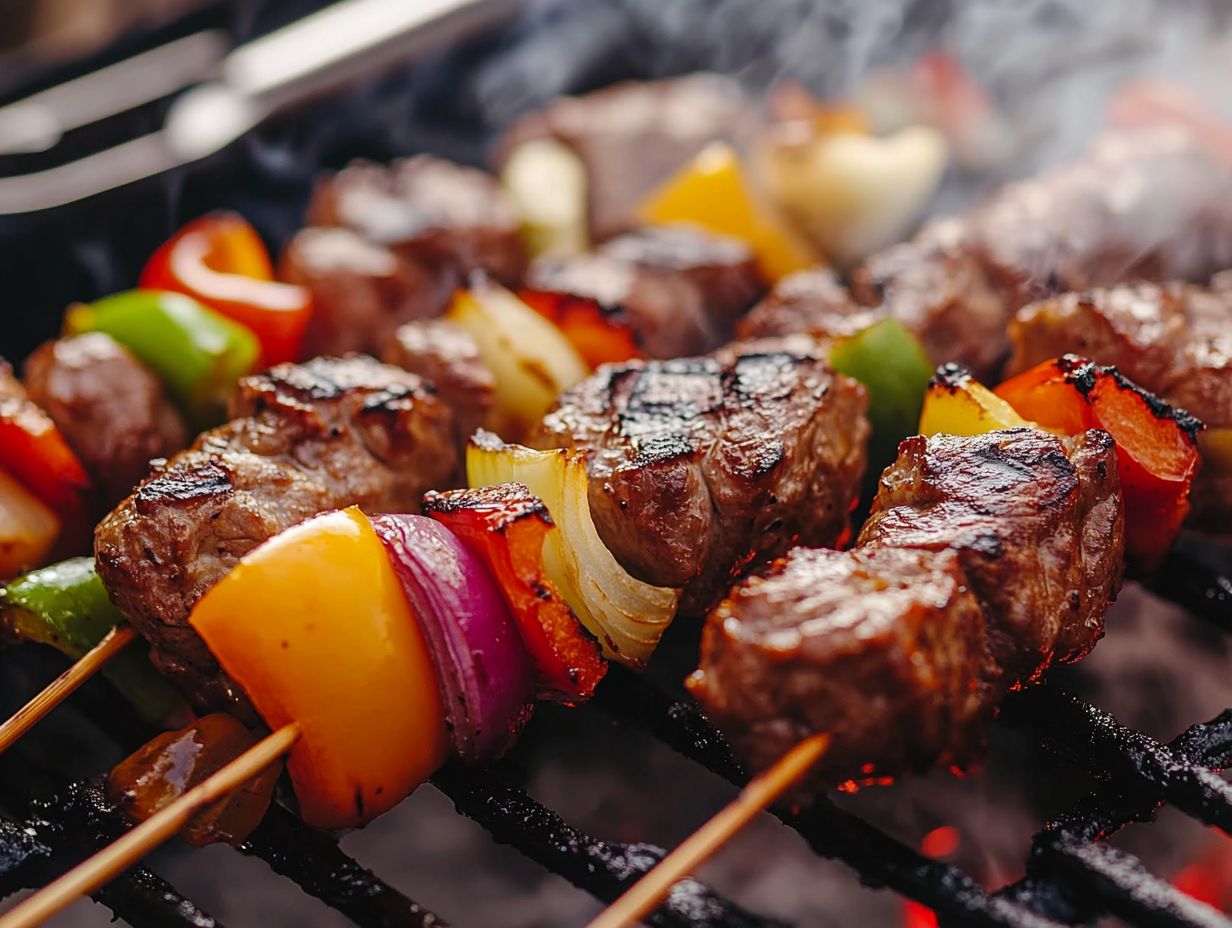
What are the best types of meat to use for kebabs?
The most popular meats for kebabs are beef, chicken, and lamb. However, you can also use pork, seafood, and even vegetarian options like tofu or mushrooms.
How should I marinate my meat for kebabs?
Marinating your meat is crucial for adding flavor and tenderizing it. Use a mixture of oil, acid (such as lemon juice or vinegar), and herbs or spices. Let the meat marinate for at least 30 minutes, but for more intense flavor, marinate overnight.
What vegetables go well with kebabs?
Common vegetables used for kebabs include bell peppers, onions, mushrooms, and zucchini. You can also add fruits like pineapple or peaches for a touch of sweetness. Just make sure to cut the vegetables into similar-sized pieces as the meat to ensure even cooking.
How do I prevent my kebabs from sticking to the grill?
To prevent sticking, make sure to thoroughly oil the grilling grates before cooking. You can also brush the kebabs with oil before placing them on the grill. Additionally, avoid moving the kebabs too much while cooking as this can cause them to stick.
Got questions about grilling kebabs? We’ve got answers!
Ready to grill the perfect kebabs? Grab your ingredients and get started!
What is the best way to cook kebabs on the grill?
To achieve even cooking, use medium heat. Rotate the kebabs every 3-4 minutes.
They usually take about 10-15 minutes to cook. Always use a meat thermometer to check that the meat reaches the right temperature.
Do I need to soak wooden skewers before using them for kebabs?
Yes, soak wooden skewers in water for at least 30 minutes. This step keeps them from burning on the grill.
You can also use metal skewers without soaking.



